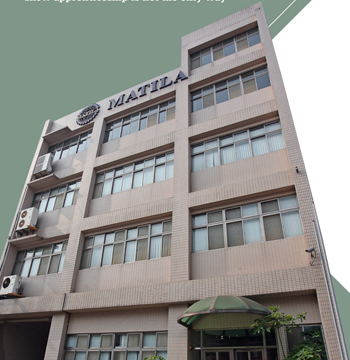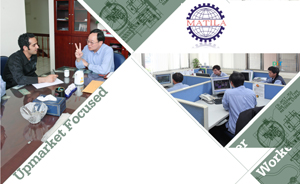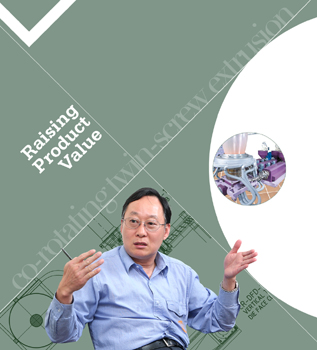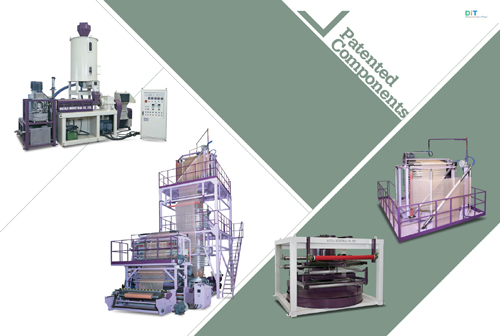Matila Successfully Evolves from Trader to Manufacturer in Plastics Machinery
2008/07/15 | By Ben Shen | MATILA INDUSTRIAL CO., LTD.While most Taiwan-based plastics processing machinery makers are feeling the pinch of skyrocketing crude oil prices, which inevitably trickle down to the cost of plastic raw materials considering that petroleum is the basis of various plastics, Matila Industrial Co., Ltd., one of Taiwan's leading makers of machinery to turn out plastic bags and blown film, has been quietly, self-assuredly holding onto its solid lead as it continues to steer through volatile times in its headquarters in Pali, Taipei County, northern Taiwan, mostly by developing innovative products that not only diversify its range but also command bigger margins.

Successfully showing its rivals with more than four decades of experience-that scientific expertise and management can quickly outdo gradual accumulation of field know-how-Matila has effectively put to use its team of mechanical designers and marketing specialists to optimize its relatively short corporate history. Fully tapping its expedient operating methods, the firm has not only set an example among its competitors, but also, in less than a decade, sharpened its manufacturing techniques to levels that have turned many global buyers into loyal clients from industrialized nations.
Matila started life as a small trading firm in 1988 by founder Jimmy C.T. Shen, now the president of the company. Even as a trader in the early years of his career, Shen realized that few domestic manufacturers of bag-making machinery can provide advanced equipment to meet the demand of industrialized nations.
Turning-point Decision
After evaluating various factors cautiously, Shen made a life-changing decision to engage in manufacturing by setting up a wholly owned factory, a move driven by his eagerness to open a brand-new horizon for Taiwan-based bag-making and blown film-making machinery by utilizing his own marketing experience.

Although most veteran makers of plastics processing machinery embrace apprenticeship as the bedrock of success, Shen believes otherwise-instead of adhering to the tried-and-true practice of transferring manufacturing technique and experience to run business-he says machinery can be effectively sold by presenting product value via showing related empirical data from textbooks.
Even prior to evolving into a supplier with its own factory, Matila, under Shen's leadership, had already penetrated the European and Latin American markets-setting up solid networking channels there, which later has helped the company a lot in global marketing and sales. Matila still derives most of its business from Europe and Latin America, rather than the neighboring Southeast Asia like other Taiwan-based peers.

A downside to exporting mostly to faraway buyers is having to sometimes handle costly after-sales service, a thorny issue Matila generally avoids by building and delivering flawless equipment, a task the firm carries out effectively by tapping its considerable wealth of mechanical design expertise.
Upmarket Focused
After acknowledging that Taiwan-made bag- and blown film-making machines leave something to be desired, Matila has been doing whatever it takes to invest in R&D as well as keep an eye on the top-end segments globally. Such conscientious approach is enabling the company to slowly build a solid global niche by offering reputable, well-designed equipment that is marketed internationally under its house brand Matila.
Sounding exactly like a man with textbook mechanical engineering training, Shen says producing high-end bag and blown-film making machinery should be based on exacting shop drawings and properly heat-treated mechanical structures. Such belief is consistently carried out in Matila's production processes with every item described in detail via mechanical engineering drawings-with the workers unable to complete their work without such graphic interpretation.
Shen's methodical technique and his R&D team's expertise in mechanical engineering design enable Matila to deliver faster turnaround when developing innovative products than others in the sector; while Shen also attributes such speediness to effective teamwork.
Worker as Partner
"The concept and practice of teamwork is critical to achieving the goal of sustainable entrepreneurship," Shen asserts. "Enterprises have to not only be profit-oriented but also fulfill social responsibility. Knowing that every worker is a bread-winner, I am obliged to care for them and value them as one of the family. Seeing each worker as partner, I offer fringe benefits as group insurance and overseas holidays."

Despite being far from Taipei City, the island's economic and financial hub, Matila has in-house multilingual personnel able to handle English, Spanish and French, making business communications with global buyers easy and effective. More importantly, such global staff enables the firm to market products worldwide without relying on trading firms.
Raising Product Value
Matila not only follows a unique management concept but also has created a widely-popular tactic to cope with sharp price hikes in raw materials as iron and steel. The company doesn't agree that cutting production cost is the most effective way to offset the adverse impact of rising material prices. "Cutting production cost has only limited effect to buffer rising material prices," Shen comments. "I think the most aggressive way is to build higher added-value into products, which I began by adopting costly imported components."
For instance, Matila employs imported German and American gearboxes. Although adopting such costly components increases its production costs, the company finds that customers are also more confident to source from its line of machines.
Integrated Production
Matila offers two major product categories: one for blown film line and the other recycling equipment. As part of its product diversification plan, Matila will debut a co-rotating twin-screw extrusion line this year at the upcoming Taipei International Plastics & Rubber Industry Show (Taipei Plas) slated for Sept. 18-22 at the Taipei World Trade Center.
The company says very few manufacturers offer co-rotating twin-screw extrusion equipment due to extremely limited market niche globally. However, after the product debut at Taipei Plas, the company will devote the entire production line in-house to turning out the new equipment, which is notable for its combination adjustment of the twin-screws to extrude plastic chips of various colors according to requirement.
Niche Market Advantage
Matila will concentrate on the high-torque models of the co-rotating twin-screw extrusion lines. The company will be safely harbored by the small market niche as only a few Western European manufacturers can produce the co-rotating twin-screw extruders, hence sparing it from harsh competition worldwide. Besides, the company can market this innovative line through its well-established global sales channels.
Shen says he is very optimistic about the company's future development. "I believe we are capable of building anything complicated that is already offered by first-tier manufacturers in Western Europe," Shen asserts. "My experience shows that we can do anything that rivals don't believe in: many domestic makers of plastics processing machines didn't believe we can transform into a manufacturer until we proved them wrong. Besides, we have quickly established our own brand globally. I deeply believe suppliers should have the guts to raise prices as long as they can offer world-class products. The image of Taiwan-made plastics machinery has to be raised by building higher-quality equipment, a move that will certainly bring in global orders."
In terms of the blown-film making machines, Matila has successfully developed 25-120mm HDPE/LDPE/LLDPE (high-density polyester/low-density PE/linear LDPE) mono-layer blown-film making machines; two-color double-layer co-extrusion lines for double-layer industrial stretch film; three-layer co-extruder blown-film making lines; five-layer co-extruder with stack-type die heads.
Also offering equipment meeting increasingly urgent global demand for recycling waste plastics, the company has different machines to process PE/PP sheet film and bottles at hourly capacities from 40-70kgs to 400-500kgs. It has also developed crushing and washing lines to pre-clean the waste film and bottles, which can reduce surface contamination on recycling equipment to enhance the quality of output pellets. The capacity for its washing line ranges from 300-1,000kg/hr, depending on the nature of waste.
Patented Components
While focusing on production of high-tier machinery, Matila has also not neglected the importance of investing in R&D to design and build in-house key components, which would help to cut cost by reducing reliance on expensive imported parts. Its conscientious effort has borne fruit: five years ago the company began designing mold heads that have been fabricated by contracted specialists.
Shen says his company's R&D efforts to develop key components have paid off, with the firm being granted in Taiwan a new-model patent for oscillating take-off system which is critical in blown film making machines. "The oscillating take-off system we develop costs only a half of that produced by well-established Europeans," Shen says proudly.
The successful development of the oscillating take-off system has enabled Matila to garner bigger margins on high-tier blown-film making machines by using more cost-effective parts made in-house. The company says it will continue developing key components to build even more high-value-added products for enhanced global competitiveness.
MATILA INDUSTRIAL CO., LTD.
186 Chunghsiao Rd., Pali, Taipei Hsien, Taiwan 249
Tel: 886-2-2619-2222
Fax: 886-2-2610-1100
http:// www.matila.com.tw
E-mail: [email protected]

